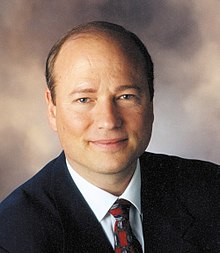
John Samuel Hagelin (born June 9, 1954) is the leader of the Transcendental Meditation (TM) movement in the United States. He is president of Maharishi International University (MIU) in Fairfield, Iowa, and honorary chair of its board of trustees. The university was established in 1973 by the TM movement's founder, Maharishi Mahesh Yogi, to deliver a "consciousness-based education".
Hagelin graduated with a Ph.D., in physics, in 1981, from Harvard University, and did several months of post-doctoral research at CERN, before moving to do further post-doctoral work at the SLAC. In 1984, he became...